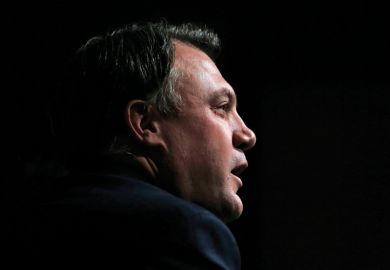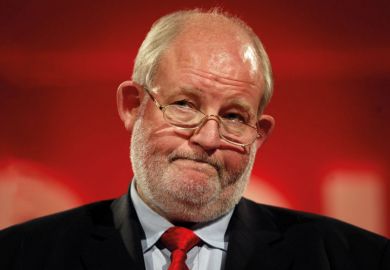Will Labour go into the general election with a manifesto commitment to abolish tuition fees in England? If so, will it make the blindest bit of difference to anything at all?
The media scent a big story in the answer to the first question, which answers the second question in some regards.
BBC political correspondent Ross Hawkins dropped into a Higher Education Policy Institute event yesterday to catch Gordon Marsden, Labour’s shadow higher education, further education and skills spokesman.
Jeremy Corbyn costed the abolition of fees and the reintroduction of maintenance grants at £10 billion in his first leadership campaign, and the pledge is viewed as key to his success. But so far, Corbyn’s pledge has not been upgraded to party policy, although it has committed to reintroducing maintenance grants – scrapped by the Conservative government.
Marsden tiptoed around the issue of fees in his speech without mentioning it, so Hawkins got in with the obvious point as first question afterwards: “Are you going to scrap tuition fees if you win the election? John McDonnell told the Times Higher there was a ‘clear commitment’ and a will to deliver.”
McDonnell told me in March that scrapping tuition fees in England was a “majority position” in Labour after Corbyn’s two leadership victories and “therefore will become policy”. Corbyn previously told me that he wanted to make the pledge party policy but was “not a dictator”.
“You will know that our manifesto processes are proceeding,” Marsden replied to Hawkins. “Good try, but you’re not going to get to that today,” he added.
Marsden continued that Labour wanted to “develop a holistic strategy whereby at every stage we can reduce the burden on students and indeed on universities, in terms of the costings that they have to handle”.
On manifesto timing, Marsden said: “The speculation is that we’d like to get something wrapped up in the next seven days.”
I interviewed Jo Johnson, the universities and science minister, today and he was at pains to attack Labour on abolishing fees (even though it has yet to commit to that as policy).
The Conservatives had offered “stability” in university funding via the system of £9,000 fees as well as ensuring that access for disadvantaged students was at “record levels”, he argued. Johnson said that a Labour government would “throw that balanced, stable and strong” (ministers have swallowed and digested the Lynton Crosby script and are now sweating it from every pore) “system into turmoil by jettisoning this very successful income-contingent loan model”.
“We’ve seen in other parts of the country much lower levels of access to higher education than we do in England, for example in Scotland, so we can see directly what would happen if we went back to the kind of model that Labour are proposing…it would be really bad for social mobility, and it would be entirely unaffordable,” Johnson continued.
“It’s just really important that in the campaign, people focus on how on earth Labour would fund the removal of tuition fees. Would they do it by spending less on health, or housing, or would they do it by raising general taxation, the burden of which would inevitably fall on middle-income families?”
So there’s a preview of the attack that the Conservatives will deploy if Labour do commit to scrapping fees.
Does that old routine of picking spending plans to bits still matter?
Vote Leave got major traction with voters in the European Union referendum with its claim that leaving the EU would make £350 million a week available to spend on public services including the NHS. That claim was flakier than a desiccated Cadbury’s Flake in the Gobi Desert – and it still persuaded plenty of voters.
But the newspapers that will be attacking any Labour fees pledge have more political traction, and more impact with voters, than the ones who scrutinised Vote Leave’s claim.
Arguably, it would be a significant development in the debate on higher education funding if Labour went into an election with a policy to substantially increase public support for universities. But with polls that show the party is highly unlikely to be forming the next government, a crushing Labour defeat might discredit such a policy in the long term.
Abolishing fees is likely to be popular with young people and students – but whether they will vote in sufficient numbers and will make a difference in the right marginal constituencies for Labour is another matter. Middle-income parents in marginal constituencies thinking of their children heading to university: they could be the most fruitful and important audience for such a policy.
While there are some potential gains, a policy to scrap fees could hurt Labour: the Conservatives already have their attack prepared and can rely on opposition from vice-chancellors very content with fees to bolster their case; the media scent a big story in pulling apart the spending plan. Those newspapers that make middle-income parents one of their target audiences might be most zealous in doing so.
Scrapping fees looks like a must for Labour, given that anything else would look like a climbdown by Corbyn on something that really matters to his biggest supporters. Can the party find a method to fund it that does not rely solely on general taxation?
If Labour does commit to abolishing fees, it must wire the funding plan correctly and ingeniously, at speed, or the policy will explode in their faces.
Register to continue
Why register?
- Registration is free and only takes a moment
- Once registered, you can read 3 articles a month
- Sign up for our newsletter
Subscribe
Or subscribe for unlimited access to:
- Unlimited access to news, views, insights & reviews
- Digital editions
- Digital access to THE’s university and college rankings analysis
Already registered or a current subscriber?




